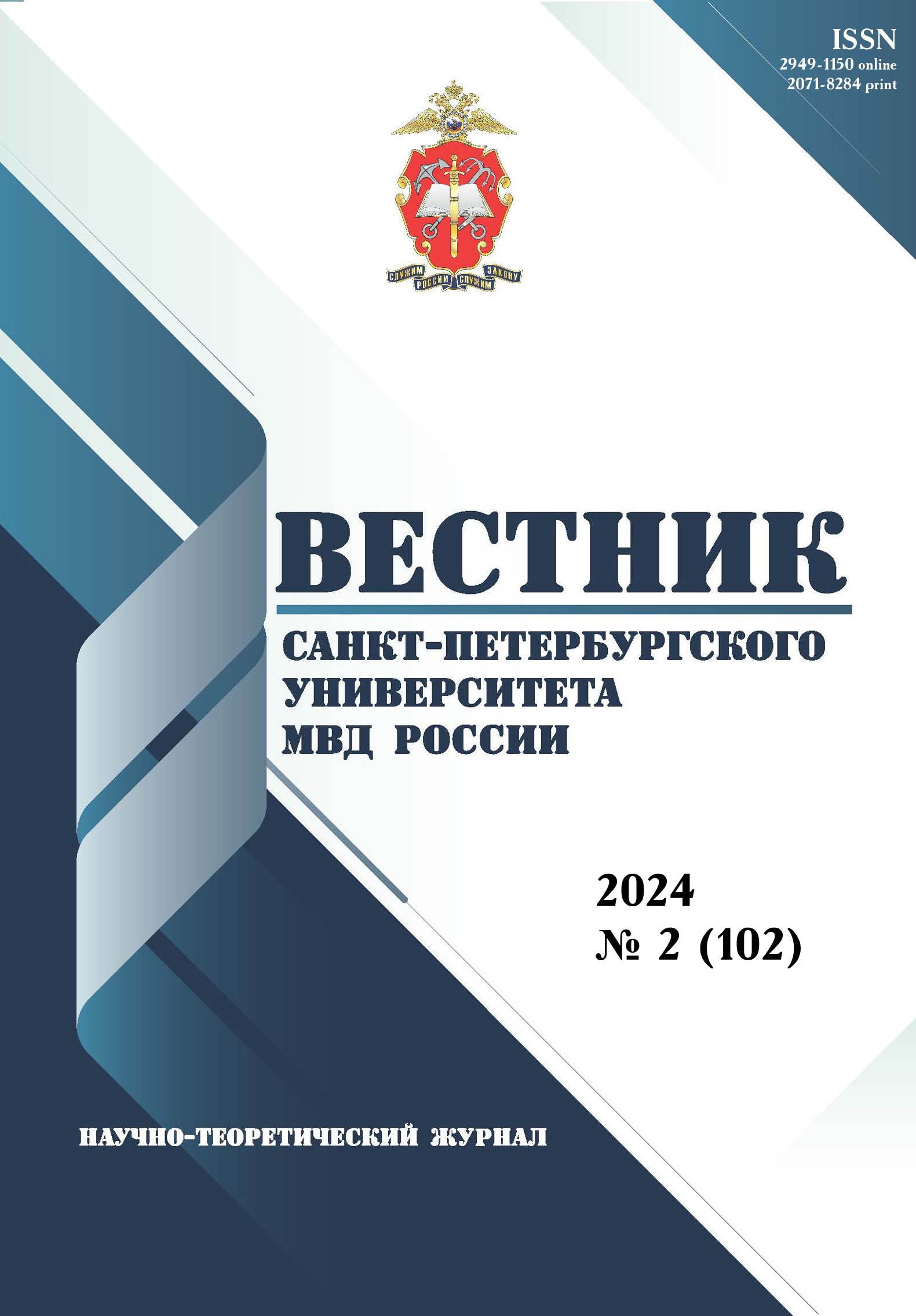from 01.01.2023 until now
Simferopol, Simferopol, Russian Federation
UDC 343.9
Introduction. The article is devoted to the description of the terrorist activity research methodology. In order to realise the cognitive experience in modern conditions, to reflect the essential characteristics of the studied objects and phenomena, their complexity and specificity of their deployment in the context of current social processes, i.e. as human-dimensional systems, it is necessary to use effective means and mechanisms of cognition corresponding to the cognitive task. The cognition of the internal specificity of terrorism, as well as the peculiarities of its manifestation in terrorist activities involves the use of effective, proven cognitive approaches, their principles and methods of research. These principles can serve as a true methodological guide in cognition and adequately reflect the essence of modern terrorism not only in the theoretical aspect, but also in law enforcement practice and law-making. Methods. The methodological basis of the research was formed by fundamental bases and postulates of philosophical methodology: universal categories, principles and regularities of dialectical and activity approaches, general scientific methodology of system approach. Results. The author substantiates that the epistemological basis of the research of terrorist activity is a number of fundamental principles of cognition: 1) cognisability, 2) objectivity, 3) determining role of practice in cognition, 4) creative activity of the subject of cognition, as well as the methodological basis - universal categories and principles of dialectical, interval and activity approaches, the methodology of system approach, and a complex set of general logical and concrete-scientific methods.
terrorism, terrorist activity, methodological instrumentarium, method, epistemological principles
1. Abisova K. S. Gnoseologicheskiye osnovy issledovaniya sovremennogo terrorizma // Vestnik Krasnodarskogo universiteta MVD Rossii. – 2020. – № 2 (48). – S. 54–58.
2. Kant I. Sochineniya : v 6 t. [per. s nem.] / pod obshch. red. V. F. Asmusa, A. V. Gulygi, T. I. Oyzermana / [T. 3 : red. i avt. vstup. st. T. I. Oyzerman]. – Moskva: Mysl’, 1964. – T. 3. – 798 s.
3. Stepin V. S. Tipy nauchnoy ratsional’nosti i sinergeticheskaya paradigma // Slozhnost’. Razum. Postneklassika. – 2013. – № 4. – S. 45–59.
4. Lebedev S. A. Klassicheskaya, neklassicheskaya i postneklassicheskaya metodologii nauki // Gumanitarnyy vestnik. – 2019. – № 2 (76). – S. 1–13; https://doi.org/10.18698/2306-8477-2019-2-596.
5. Lebedev S. A. Postneklassicheskaya epistemologiya: osnovnyye kontseptsii // Filosofskiye nauki. – 2013. – № 4. – S. 69–83.
6. Lazarev F. V., Novosolov M. M. Problema istiny v sotsial’no-gumanitarnykh naukakh: interval’nyy podkhod // Voprosy filosofii. – 2005. – № 10. – S. 95–115.
7. Novoselov M. M. Logika abstraktsiy : (Metodologicheskiy analiz). – Moskva: IF RAN, 2000. – CH. 1. – 188 s.
8. Krichevskiy G. Vvedeniye v NBIKS-tekhnologii // NBIKS-Nauka. Tekhnologii. – 2017. – № 1. – S. 27–54.
9. Ignatov A. N. Tekhnologicheskoye razvitiye chelovechestva i perspektivy transformatsii ugolovnoy politiki i kul’tury protivodeystviya prestupnosti / Ugolovnaya politika i kul’tura protivodeystviya prestupnosti : materialy Mezhdunarodnoy nauchno-prakticheskoy konferentsii, 21 sentyabrya 2018 g. : v 2 t. – Krasnodar: Krasnodarskiy universitet MVD Rossii, 2018. – T. I. – S. 81–91.
10. Ignatov A. N., Il’yanovich Ye. B. Metodologicheskiye osnovy issledovaniya prestupnosti // Obshchestvo i pravo. – 2015. – № 2 (52). – S. 129–133.
11. Antonyan Yu. M. Terrorizm. Kriminologicheskoye i ugolovno-pravovoye issledovaniye. – Moskva: Shchit-M, 1998. – 305 s.
12. Gusev N. N. Terrorizm v kontekste sotsiologicheskikh paradigm // Vestnik Moskovskogo universiteta MVD Rossii. – 2014. – № 9. – S. 35–39.
13. Gulevskiy A. N. Voyna, revolyutsiya, terrorizm v global’nom mire // Vestnik Kalmytskogo universiteta. – 2022. – № 2 (54). – S. 86–91; https://doi.org/10.53315/1995-0713-2022-54-2-86-91.
14. Dzhabbarinasir Kh. R. Vliyaniye sovremennogo mezhdunarodnogo terrorizma na osnovnyye megatrendy sovremennoy mirovoy politiki // Vestnik Volgogradskogo gosudarstvennogo universiteta. Seriya 4. Istoriya. Regionovedeniye. Mezhdunarodnyye otnosheniya. – 2021. – T. 26. – № 3. – S. 22–33; https://doi.org/10.15688/jvolsu-4-2021-3-3.
15. Mel’nikova A. A. Suitsidal’nyy terrorizm kak kul’turnyy fenomen // Sotsial’nogumanitarnyye znaniya. – 2020. – № 1. – S. 74–82; https://doi.org/10.34823/SGZ.-2020-1-51290.
16. Sidorenko A. G., Tikhomirov Yu. V. Terrorizm i antiterroristicheskaya bezopasnost’ v kontekste istorii i sovremennoy geopolitiki. – Moskva: Kuchkovo Pole, 2011. – 639 s.
17. Ignatov A. N. «Kriminologiya zavtra» nuzhna uzhe segodnya // Obshchestvo i pravo. – 2016. – № 4 (58). – S. 94–99.














